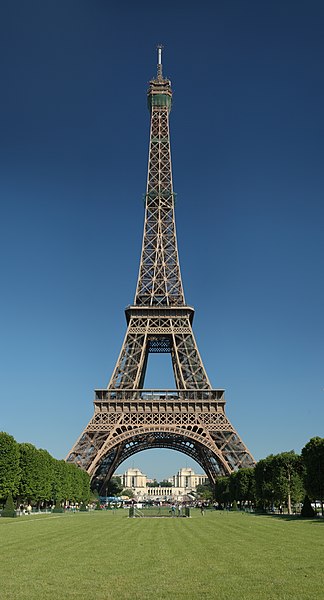Difference between revisions of "About France"
(Created page with "{{#eimage:http://upload.wikimedia.org/wikipedia/commons/thumb/a/a8/Tour_Eiffel_Wikimedia_Commons.jpg/324px-Tour_Eiffel_Wikimedia_Commons.jpg|410x579px|thumb|'''The Eiffel Towe...") |
m |
||
| Line 3: | Line 3: | ||
[[France]] today is one of the most modern countries in the world and is a leader among European nations. It plays an influential global role as a permanent member of the United Nations Security Council, NATO, the G-8, the G-20, the EU and other multilateral [[organizations]]. [[France]] rejoined NATO's integrated military command structure in 2009, reversing DE GAULLE's 1966 decision to take French forces out of NATO. Since 1958, it has constructed a hybrid presidential-parliamentary governing [[system]] resistant to the instabilities experienced in earlier, more purely parliamentary administrations. In recent decades, its reconciliation and cooperation with [[Germany]] have proved central to the economic integration of Europe, including the introduction of a common currency, the euro, in January 1999. In the early 21st century, five French overseas entities - French Guiana, Guadeloupe, Martinique, Mayotte, and [[Reunion]] - became French regions and were made part of [[France]] proper. | [[France]] today is one of the most modern countries in the world and is a leader among European nations. It plays an influential global role as a permanent member of the United Nations Security Council, NATO, the G-8, the G-20, the EU and other multilateral [[organizations]]. [[France]] rejoined NATO's integrated military command structure in 2009, reversing DE GAULLE's 1966 decision to take French forces out of NATO. Since 1958, it has constructed a hybrid presidential-parliamentary governing [[system]] resistant to the instabilities experienced in earlier, more purely parliamentary administrations. In recent decades, its reconciliation and cooperation with [[Germany]] have proved central to the economic integration of Europe, including the introduction of a common currency, the euro, in January 1999. In the early 21st century, five French overseas entities - French Guiana, Guadeloupe, Martinique, Mayotte, and [[Reunion]] - became French regions and were made part of [[France]] proper. | ||
| − | Source: | + | Source: www.cia.gov/library/publications/the-world-factbook/geos/fr.html |
Back to [[Adopting from France]] | Back to [[Adopting from France]] | ||
Latest revision as of 02:02, 25 March 2018
France today is one of the most modern countries in the world and is a leader among European nations. It plays an influential global role as a permanent member of the United Nations Security Council, NATO, the G-8, the G-20, the EU and other multilateral organizations. France rejoined NATO's integrated military command structure in 2009, reversing DE GAULLE's 1966 decision to take French forces out of NATO. Since 1958, it has constructed a hybrid presidential-parliamentary governing system resistant to the instabilities experienced in earlier, more purely parliamentary administrations. In recent decades, its reconciliation and cooperation with Germany have proved central to the economic integration of Europe, including the introduction of a common currency, the euro, in January 1999. In the early 21st century, five French overseas entities - French Guiana, Guadeloupe, Martinique, Mayotte, and Reunion - became French regions and were made part of France proper.
Source: www.cia.gov/library/publications/the-world-factbook/geos/fr.html
Back to Adopting from France
